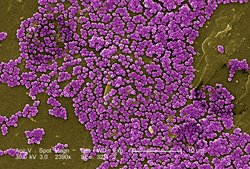|
Antibiotic resistance is no longer limited to hasty prescriptions or hand soaps.
In New Delhi, India, antibiotic-resistant bacteria have been found in water used for drinking, washing, and cooking. Researchers from Cardiff University tested the public water supply in India’s capital city. What Timothy Walsh and his colleagues found were bacteria known as “superbugs.” These super species of bacteria contain a gene that makes them resistant to antibiotics. The gene’s secret weapon is an enzyme called New Delhi metallo-beta-lactamase, or NDM-1. Bacteria that contain this enzyme are dangerous because the infections they cause, including cholera and dysentery, cannot be treated with antibiotics. In fact, Walsh says the only medication that can treat these resistant bacteria has toxic effects in humans. The gene that produces NDM-1 was initially discovered in 2008, but its presence in New Delhi’s water supply indicates that the gene is spreading. The researchers found the gene in 14 different species of bacteria in New Delhi. It had not previously been seen in 11 of those species. Newspapers have now reported the presence of the resistant bacteria in India, Pakistan, the United Kingdom, the United States, Canada, Japan and Brazil. The results of the study were published in the online edition of the Lancet Infectious Disease Journal last Thursday.
0 Comments
Leave a Reply. |
with intentions.
|

 RSS Feed
RSS Feed
